Jordan and America are about 6000 miles apart. The people in each country are different, the systems of government are different, the lifestyles are different and the predominant religions of each country are different. And yet, there is something very familiar about the ways in which the people of each country celebrate their two major holidays--Christmas and Ramadan.
I came to this realization when we were shopping at Safeway the night before the start of the Ramadan fast. The store was packed with people rushing around, buying all sorts of last minute food items, and the lines at the checkout lanes snaked out onto the concourse, the carts overflowing with Ramadan treats in bulk. "Is this what Ramadan is supposed to be about?" I said to myself. "Everyone running around, stressed out, and buying, buying, buying?"
Of course soon after that sentiment I remembered that the Christmas season is a lot like what I was witnessing in Safeway. Have you ever been to a mall at any point between Thanksgiving and Christmas? Have you seen the yearly television footage of people trampling over each other the morning after Thanksgiving--The Biggest Shopping Day of the Year--for cheap deals on DVD players, computers or the latest trendy doll? Yes, this mad rush in Safeway, I realized, was indeed a lot like Christmas.
Because of this Safeway Epiphany, over the next several days I began to more purposefully look around for other similarities in the ways Americans and Jordanians celebrate Christmas and Ramadan. What follows are the results of my immediate observations.
LIGHTS OF THE SEASON
The Christmas season is of course the time for everyone to decorate their homes and yards with Christmas lights, and during Ramadan, people here do the same. The lights are less extravagant here--no one is blanketing their home with lights in an attempt to win a Ramadan decoration contest or to get on the evening news--but Ramadan lights are definitely a part of the season all the same. What is most common is a simple stream of lights hung from one point to another, a string of stars with a single, larger crescent moon or simply one crescent moon with a smaller star beside it.
Of course soon after that sentiment I remembered that the Christmas season is a lot like what I was witnessing in Safeway. Have you ever been to a mall at any point between Thanksgiving and Christmas? Have you seen the yearly television footage of people trampling over each other the morning after Thanksgiving--The Biggest Shopping Day of the Year--for cheap deals on DVD players, computers or the latest trendy doll? Yes, this mad rush in Safeway, I realized, was indeed a lot like Christmas.
Because of this Safeway Epiphany, over the next several days I began to more purposefully look around for other similarities in the ways Americans and Jordanians celebrate Christmas and Ramadan. What follows are the results of my immediate observations.
LIGHTS OF THE SEASON
The Christmas season is of course the time for everyone to decorate their homes and yards with Christmas lights, and during Ramadan, people here do the same. The lights are less extravagant here--no one is blanketing their home with lights in an attempt to win a Ramadan decoration contest or to get on the evening news--but Ramadan lights are definitely a part of the season all the same. What is most common is a simple stream of lights hung from one point to another, a string of stars with a single, larger crescent moon or simply one crescent moon with a smaller star beside it.
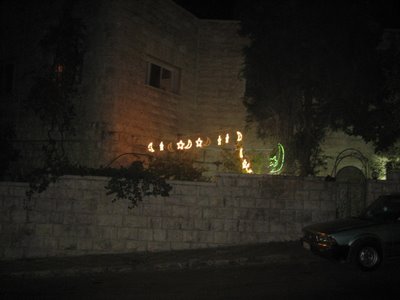

SYMBOLS OF THE SEASON
Regardless of the religious nature of Christmas, the predominant symbol of the season is the Christmas Tree. Here in Jordan, Ramadan is also celebrated with a predominant symbol, and that symbol is a lantern, or Fanous. Just as with the Christmas Tree, the Fanous is not necessarily a religious symbol, but they are found hanging in front of buildings and are pictured on almost any Ramadan related item. The night before the fast, we saw many people walking out of stores with one, like a family bringing home a tree.
FOOD FOR THE SEASON
If there is one particular food that every person in Jordan has to have during Ramadan, it is an after dinner treat called qatayef. Similar to little pancakes, qatayef is usually folded in half and filled with cheese, cream, cinnamon and pistachios or walnuts, and is topped with a drizzling of honey. All over Amman in the afternoon you can see lines of people buying qatayef at bakeries to eat later in the evening when people visit. At first I thought, "How funny to have a special food that everybody loves but is only eaten during one month of the year." I quickly remembered, though, that there are a plethora of special treats that people at home only eat at Christmastime. And, of course, there is eggnog. Nobody drinks eggnog in July.
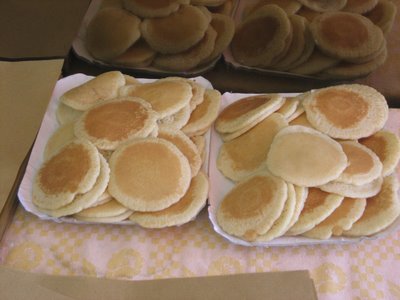
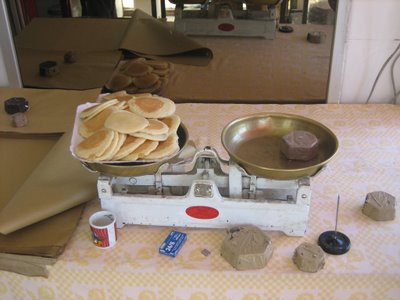
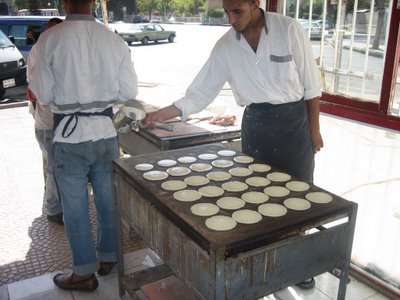
MARKETING FOR THE SEASON
Like during Christmas in North America, during Ramadan many businesses in Amman focus their marketing efforts around the holiday. Businesses have special sales, as signs can be seen all over town advertising various Ramadan discounts. Stores and shops of all sizes decorate for the season. For instance, the picture below shows the inside of Safeway decorated with what I think are either depictions of the tops of Ramadan lamps or the dome that is a part of many mosques. Also, even Starbucks has special Ramadan take away cups--just like we have for Christmas--decorated with stars and the Ramadan lamp.
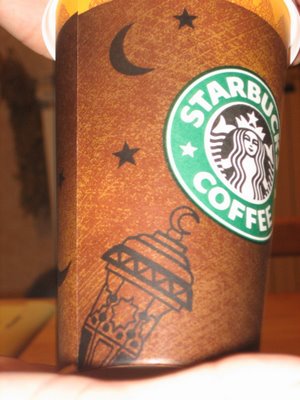
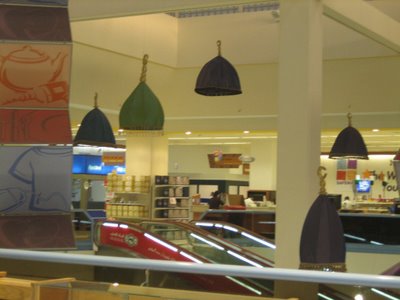
THE CONCERN OF THE SEASON
Finally, no comparison of these two holidays would be complete without reference to the major concern that it seems both Christians and Muslims share--that their holidays have become too materialistic. Christians can sometimes be heard worrying that the spiritual aspects of Christmas are lost amidst such a great focus on gifts. However, as this article from an Egyptian newspaper shows, it is important to note that Muslims worry about this too. Amidst all the hustle and bustle, the shopping and the marketing, many Muslims also worry that the spiritual apsects of their holiday are getting lost. After being in Jordan now almost six months--and through previous experiences too--I know that there are a lot of differences bewteen me, the people from my homeland and people from this part of the world. Nevertheless, there is still a lot about us that we share.


